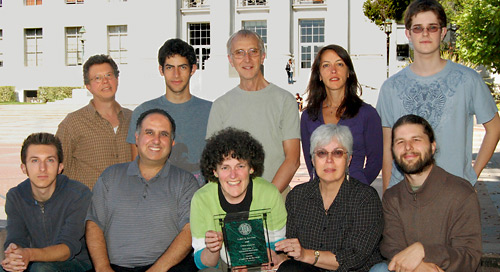 Members
of the GradLink-on-the-Web (GLOW) team, with their Sautter
Award. Back row: Morgan Milligan, Yehonatan Sella, Dennis
Andersen, Moira Perez, Andrew Bullen; Front row: Joe
Gallo, Benjamin Darmoni, Judy Dobry, Betsy Livak, Bill
Clark. (Dick Corten/UC Berkeley
photo)
Members
of the GradLink-on-the-Web (GLOW) team, with their Sautter
Award. Back row: Morgan Milligan, Yehonatan Sella, Dennis
Andersen, Moira Perez, Andrew Bullen; Front row: Joe
Gallo, Benjamin Darmoni, Judy Dobry, Betsy Livak, Bill
Clark. (Dick Corten/UC Berkeley
photo)Berkeley's GradLink-on-the-Web wins Sautter Award, UC's top technology honor
Graduate Division takes an 'agile, lean approach' to putting businesses processes online
| 22 June 2009
BERKELEY — Last week the University of California recognized UC Berkeley's GradLink-on-the-Web (GLOW) and its developers with the Larry L. Sautter Award for Innovation in Information Technology, which honors top technology projects from the 10 UC campuses. UC Davis Health System's Computerized Provider Order Entry and UCLA's iTunes U also received Sautter gold awards.
The GLOW project at Berkeley was initiated in 2006 to provide a web-based platform for GradLink, the Graduate Division's information-tracking system used by academic departments that admit, hire, award, and advise graduate students. GLOW aims to streamline these functions for the Graduate Division's constituents — more than 10,000 graduate students and 25,000 applicants, as well as faculty and staff in 100-plus graduate programs.
"We use an agile, lean approach to develop software and get products out quickly," says Betsy Livak, co-director of Systems and Technology in the Graduate Division. In software-development terms, agility means the ability to accomplish tasks quickly and flexibly. And being lean means looking at processes with a critical eye and eliminating unnecessary steps. Livak contrasts her group's productivity — two to three projects a semester — with that of typical software rollouts that require a year.
Automating a cumbersome process at Lawrence Berkeley National Lab
Recently GLOW automated an error-prone, time-consuming process at Lawrence Berkeley National Laboratory (LBNL), which hires Berkeley grad students and is required to pay fee remissions for qualifying appointments. In the past, LBNL staff manually entered student data on a spreadsheet, then sent it to the Graduate Division Appointments Unit. Input errors were common, and Grad Division staff had to double-check the entries. The spreadsheet then went to a programmer, who transferred the information to a Grad Division database for use by the campus's billing system.
Graduate Division developers streamlined this cumbersome process with a module allowing LBNL staff to log onto GLOW, enter a student ID, access the student's name and eligibility data, then select from a list of fee-remission options, and store this information for use by the campus billing system.
The benefits of the new system are many: LBNL's fee-remission payments are now easier and more efficient; Graduate Division staff no longer need to review data for accuracy; and student fees are paid more quickly, allowing students to register for classes on time.
The GLOW team uses a scoring sheet with weighted criteria to prioritize projects that will have the most impact on their clients, increase efficiencies, and ensure security of data. GLOW projects also must be "2x2" — limited to two screens or reports, and ready to roll out in about two months. They fall into two categories: Some make information available on the Web that was previously accessed via databases. Other GLOW modules are interactive, automating data-entry tasks that were once paper-based and handled manually.
Moira Perez, chief administrative officer of the Graduate Division, who submitted the award nomination, attributes GLOW's successful track record to "the way the team works, the processes we've put into place for selecting new projects, and their technological approach. Those elements enable us to develop a lot of cool, new things quickly." Perez notes that by completing projects quickly "we're showing it's possible."The GLOW team has made it possible for Graduate Division staff to update student records, instead of being dependent upon Systems staff to do so. GLOW also has enabled users to authenticate via a secure web-based screen, rather than through a system with unwieldy client/server technology.
Projects in the pipeline include a module that will enable departments to track which graduate students have not yet registered (their registration numbers affect the amount of funding the university receives from the state), and whether the student is eligible to work as a graduate-student instructor or receive awards based on GPA and completed units.
This summer GLOW will also introduce a program-report module for departmental data on graduate-student enrollment, admissions, surveys, and placement. To date, these reports have only been available in paper form, says Perez; the new module will make that information more easily accessible. According to Andrew Szeri, dean of the Graduate Division, research has shown that such reports help departments improve completion rates and time to degree.
Faculty members, too, appreciate GLOW: "Usually, having to work with a new computerized system spells bad news. Not this time — I found GLOW to be very useful and a big improvement over reading paper files," says Niek Veldhuis, associate professor of Near Eastern Studies. Xin Liu, assistant professor of anthropology, says that GLOW "has made everything convenient and easier."
For questions about GLOW, e-mail gradsys@berkeley.edu.

